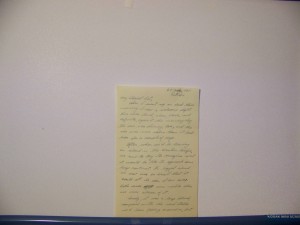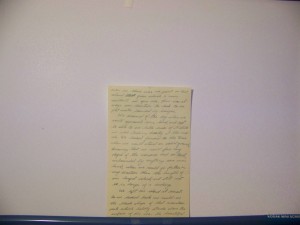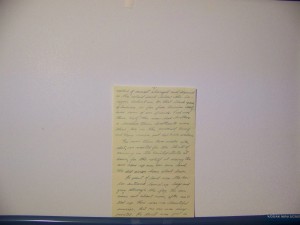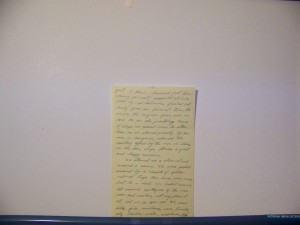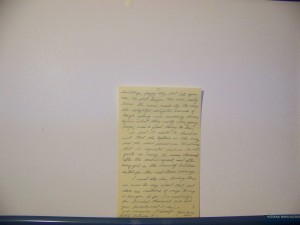My only comment on this entry from Dart is that at some point after receiving it, Dot changed the date to say “June 29,” however, the actual date was July 29.
It’s such a great descriptive letter that my only job is to transcribe it verbatim for readers to enjoy.
When I went up on the deck this morning I saw a welcome sight. There was land, clear. black and definite against the morning sky. The sun was shining too, and the sea was more calm than it had been for a couple of days.
Often, when we’d be leaving an island in the Western Pacific, we used to try to imagine what it would look like to approach some huge continent. The biggest island we saw was so small that it could all be seen in one sweep. Both ends were visible when we were abeam of it.
Surely, it was a large island compared to the coral atolls we’d been fooling around on, but even so, there was no point on that island from which a man couldn’t see opean sea. There was always some direction to look to see flat water surrounded by horizon.
We dreamed of the day when we could approacj some land, and not be able to see both ends of it while we were looking directly at the middle. We looked forward to the time when we could stand on solid ground, knowing that we could face any degree of the compass and see land, unbounded by anything save more land; when we could go further in any direction than the length of our largest island, and still not be in danger of a ducking.
We left one island at sunset. As we looked back, we could see the black shape of that mountain peak which boldly stands above the surface of the sea. The beautiful colors of the sunset changed and deepend as the island sank below the horizon behind us. On that black speck of America, so far from America itself, were some of our friends. Fred was there. Half the crew had brothers or buddies there. Sweethearts were there, too, in the persons of Army and Navy nurses, and Red Cross workers.
For more than two weeks after that, we waited for the thrill of arriving in the United States at dawn; for the relief of seeing the sun come up over our own land. We did arrive home about dawn.
The point of land near the harbor entrance loomed up large and gray through the fog. The sun came out about noon, after we’d tied up. There was no beautiful sunrise. But no one was disappointed. The thrill was just as great. A three-hundren foot ‘homecoming’ pennant, supported at intervals by red balloons, floated listllessly from our foremast. Even the snipes, the engineer force were on deck to see the proceedings. Crews of ships we passed came to attention as we steamed proudly by. Our men, in dungarees, returned the courtesy offered by the men in blues on the other ships. It was a great and happy occasion.
We steamed up a channel and around a curve. We were pushed around by a couple of yellow-cabined tugs. Our lines were made fast to a dock. We looked around. All around. 360 degrees of a compass. And nowhere, not any place at all, did we see open sea. We saw hills, girls, civilians, cars, trucks, oily harbor water, airplanes, big buildings, foggy sky, but no open sea. No flat horizon. We were really home. The noise made by the crew; the delightful, delighted sounds of tough young men suddenly becoming what they were, young boys; was a good thing to hear.
In fact, it could be heard so well that the Captain on the bridge had word passed over the phones that he “requested” that we not be quite so noisy. The noise decreased after the second request, and after every girl in the vicinity had been dated for the next three evenings.
I must stop here, Darling. There’s no more to say about that, but there are millions of ways to say “I love you.” So far, I’ve used only a few hundred thousand. Pick out your favorite, insert here ( ) and remember it always.
That’s all the letters written by either Dart or Dot in July 1945. Check back on August 1.
